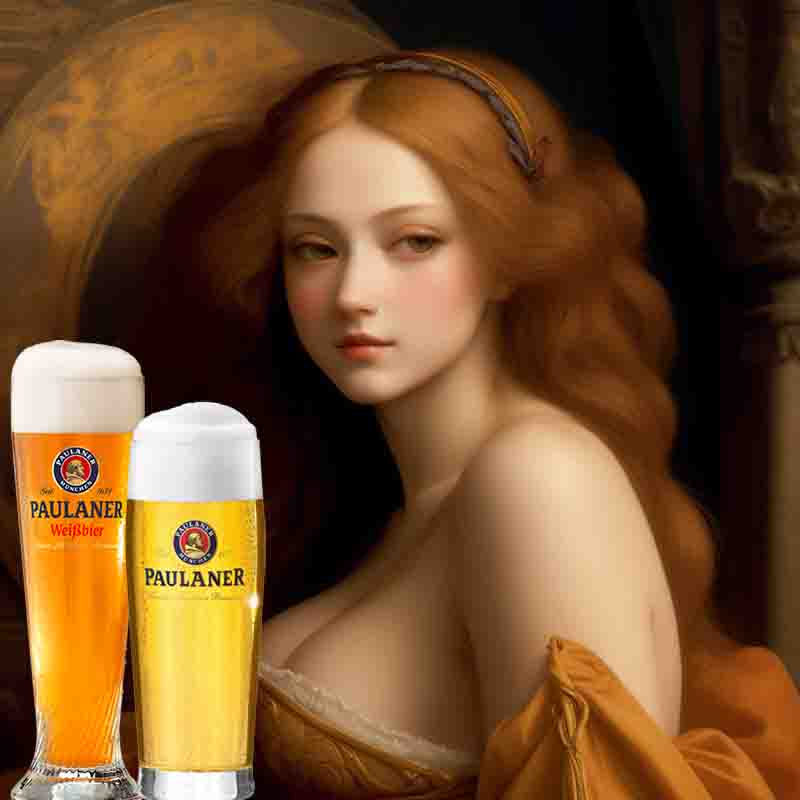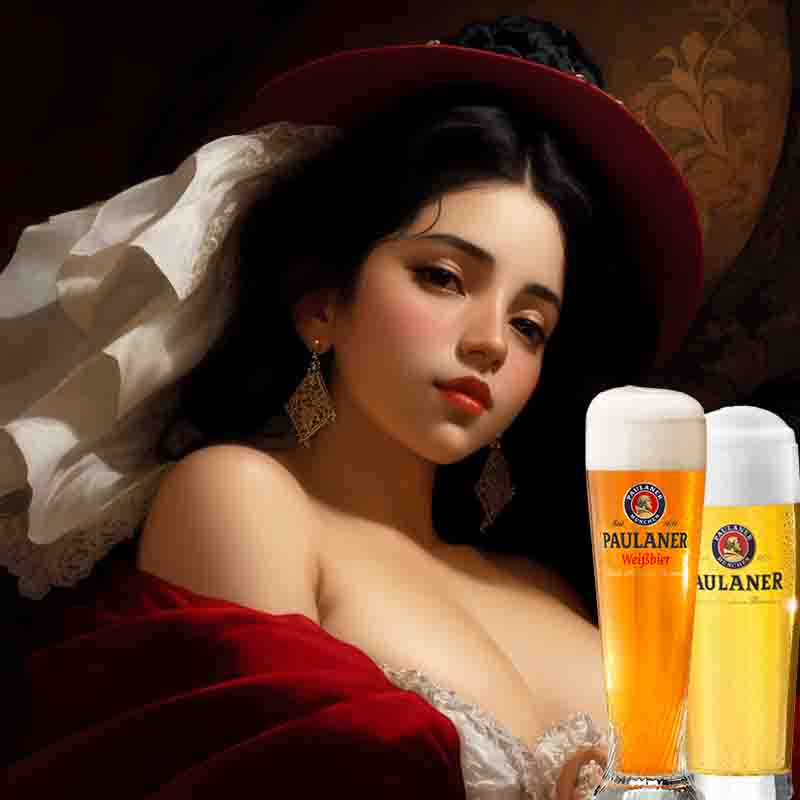Paulaner's journey from the monastery to global brewery
The story of Paulaner Brewery traces back to the Neudeck ob der Au monastery in the beer capital Munich, where resourceful monks crafted "Salvator" beer as sustenance during Lent. What began as an act of necessity evolved into a brewing legacy that has transcended centuries and continents.

Paulaner Brewery's repertoire isn't just a collection of beers; it's an ode to the multifaceted flavors of Bavaria. From the crisp Munich Lager to the aromatic Hefe-Weißbier, each sip takes you on a journey through the landscapes of taste.
Paulaner is a well-known brewery based in Munich, Germany, with a history dating back to 1634. The brewery was founded by the Minim friars of the Neudeck ob der Au monastery, and the name "Paulaner" is derived from the order's founder, Francis of Paola.
Paulaner's Evolution in Beer Brewing
Paulaner Brewery's roots may lie in Bavaria, but its impact extends far beyond the boundaries of its origin. The brewery's commitment to quality, tradition, and innovation has propelled it onto the global stage, earning it recognition and respect from beer enthusiasts and connoisseurs around the world.
Paulaner Brewery is a leading player in Munich's grandest beer spectacle: the Oktoberfest.
Paulaner's worldwide reputation speaks not only for the quality of its beers, but also for the brewery's ability to combine tradition, innovation, and authenticity to create an impressive entity that delights people on every continent.
Paulaner Bräuhaus:
-
Kapuzinerplatz 5 - 80337 Munich
-
Open daily from 10am until 11pm (the beer hall is open until 1am)
-
Reservation: +49-(0)89-5446110 - paulaner-brauhaus.com/muenchen/facilities/
Paulaner: From monastic beginnings to international acclaim
Paulaner demonstrates that tradition and modernity can coexist harmoniously. Leveraging technology while preserving traditional techniques, the brewery maintains authenticity in a changing world. By embracing technology while preserving time-honored methods, the brewery crafts a symphony of flavors that cater to both history and today
-
1634: According to the Purity Law of 1516, the monks in Munich's Neudeck ob der Au monastery are brewing a strong beer, the Paulaner Salvator.
-
1751: The Paulaner monks are officially entitled to serve beer on the day of their religious patron
-
1773: Valentin Stephan Still, a monk known as Brother Barnabas, is appointed brewmaster at the Neudeck ob der Au monastery. His innovative brewing skills set new standards in terms of taste and quality. Even today, his formula from that time is used as the basis for Paulaner Salvator.
-
1806: Franz Xaver Zacherl assumes control of the brewery from the monks after secularization. The local community now also refers to the brewery as the "Zacherlbrau".
-
1818: The first beer halls are set up at the Wiesn. Paulaner is granted the concession to serve beer. Eight years earlier, a big horse race was celebrated here when the heir to the throne Ludwig I married Princess Therese of Saxony-Hildburghausen. At that time, the largest folk festival in the world was created.
-
1881: The Paulaner Brewery embraces the new technologies and keeps up with the changing times. It employs one of the first ice machines developed by Carl von Linde. From this point on, all-year-round brewing is feasible.
-
1944: After a bombing raid in 1944, the Paulaner brewery is largely destroyed. By 1950, the brewery is once again reconstructed in its entirety.
-
1979: The Schorghuber family takes over the control of the Paulaner brewery. To this day, Paulaner is majority-owned by the Munich-based corporate dynasty
-
1987: With Waitzinger Weise, Paulaner produces the world's first non-alcoholic wheat beer, known as the Hefe-Weissbier Alkoholfrei
-
1989: Paulaner Brauhaus Consult GmbH opens a brewery at Kapuzinerplatz in Munich as the headquarters of Paulaner Gaststatten with its own brewing operations. Other breweries soon follow, including in Beijing, Shanghai, Singapore and St. Petersburg.
-
2016: Paulaner exports 1 million hectoliters to the world for the first time in its history. Paulaner beer is now enjoyed in over 70 countries.
From Munich's cobblestone streets to the farthest corners of the globe, Paulaner's name reverberates. Its beers and traditions have become more than just a Bavarian gem; they're a symbol of excellence in the world of brewing. It's a legacy that binds Munich's past, present, and future in each frothy sip.
Paulaner Brewing traditions

At the heart of Paulaner's legacy lies the iconic Salvator beer. With its robustness, malty sweetness, and rich history, this brew is a living testament to the monks' ingenuity and Bavaria's deep-rooted brewing culture.
Paulaner's Monastic Foundation
In the early 17th century, during a time when monastic life played a significant role in society, the Paulaner monks of the Neudeck ob der Au monastery found themselves facing a unique challenge, fasting and abstinence during Lent.
Monastic life was centered around spirituality, discipline, and self-denial. This period of fasting and abstinence observed by Christians, required them to abstain from consuming solid food.
Recognizing the need for sustenance during this period, the Paulaner monks, renowned for their resourcefulness turned to brewing beer as a solution.
Brewing for Nourishment: "Liquid Bread"
The Paulaner monks, known for their resourcefulness, decided to craft a beer that would sustain them throughout Lent.
The monks recognized that beer could be a nutritional alternative to solid food. Beer, being a liquid, allowed them to receive essential nutrients without violating the rules of fasting
This beer, brewed with a higher alcohol content and a richer malt profile, not only provided them with the necessary nutrients but also became a testament to their brewing skills.
Salvator: A Beacon of Tradition
The beer that emerged from the monastery's brewing vats came to be known as "Salvator," a name derived from the Latin word for "Savior".
Salvator beer was a robust, full-bodied brew that not only provided nourishment but also warmth during the cold Lenten months.
Salvator not only symbolized sustenance but also became a testament to the monks' ingenuity and dedication to their faith.
Local Popularity and Beyond
The unique flavor and character of Salvator beer captured the taste buds of the local population.
It wasn't long before word spread beyond the monastery walls, and people from Munich and beyond sought out this exceptional brew.
As the popularity of Salvator grew, the Paulaner monks realized that they had something special on their hands.
Transition to Commercial Brewing
Recognizing the demand for their beer, the Paulaner monks made a pivotal decision: they embraced commercial brewing.
This marked the transition from brewing solely for monastic needs to catering to a broader audience.
The decision not only ensured the sustainability of the monastery but also laid the foundation for Paulaner Brewery as we know it today.
Legacy of Craftsmanship
The dedication to quality and craftsmanship that began within the walls of Neudeck ob der Au monastery continued to shape Paulaner Brewery's brewing philosophy.
Despite the passage of centuries and changing societal landscapes, the commitment to creating exceptional beer using traditional methods remains at the core of Paulaner's identity.
The Neudeck ob der Au monastery in Munich served as the cradle of Paulaner Brewery, giving birth to a brewing legacy that spans generations.
The demand for Salvator exceeded the expectations of the monks. What was initially brewed for the monks' consumption during Lent became a sought-after elixir that extended far beyond the confines of the monastery.
The monks' ingenuity, borne out of a need for nourishment, blossomed into a renowned brewery that continues to honor its origins while celebrating Bavarian brewing traditions.
Paulaner Brewery's Triumph Over Historical Challenges
The history of Paulaner Brewery is a testament to its resilience in the face of adversity. Throughout its journey, the brewery confronted challenges posed by historical events such as World Wars and economic shifts.
Yet, the determination to uphold its legacy and commitment to quality allowed Paulaner to overcome these obstacles and emerge stronger.
Paulaner Brewery's Commitment to Time-Honored Brewing
In an era of rapid technological advancements and changing consumer preferences, Paulaner Brewery stands as a testament to the harmonious coexistence of tradition and innovation.
Despite modernization efforts, the brewery remains unwavering in its commitment to preserving traditional brewing methods that have defined its legacy.
Paulaner Beer Portfolio
Experience the world of the Paulaner Brewery, where centuries-old Bavarian brewing tradition and excellence come to life. Discover a diverse selection of beers, from iconic Munich Lager to refreshing Hefe-Weißbier.
-
Paulaner Original Munich Lager: A classic and iconic lager that embodies the rich tradition of Munich brewing. This beer features a balanced maltiness and a clean, crisp finish, making it a go-to choice for those seeking a true Bavarian lager experience.
-
Paulaner Hefe-Weißbier: A refreshing wheat beer with a hazy appearance and fruity notes. Hefe-Weißbier offers a harmonious blend of banana and clove aromas, delivering a taste of traditional Bavarian wheat beer culture.
-
Paulaner Oktoberfest Bier: Brewed specifically for Oktoberfest celebrations, this beer captures the festive spirit of the event. It's a full-bodied and slightly stronger lager, characterized by its malty sweetness and smooth finish.
-
Paulaner Weißbier Dunkel: This dark wheat beer presents a rich and complex flavor profile with hints of roasted malt and caramel. It's a unique twist on the traditional wheat beer style.
-
Paulaner Salvator: The original strong beer brewed by the Paulaner monks, Salvator is a doppelbock that's known for its malty sweetness, hints of dark fruit, and a warming alcohol presence.
-
Paulaner Original Münchner Urtyp: An unfiltered, unpasteurized beer that pays homage to the brewery's original recipe. It's a full-bodied lager with a slightly hoppy bitterness and a robust malt backbone.
-
Paulaner Maibock: A seasonal beer released in spring, Maibock is a pale and hoppy bock beer with a well-balanced profile. It offers a mix of malty sweetness and floral hop character.
-
Paulaner Münchner Hell: This "Hell" (pale) lager is known for its light and crisp nature. It's an easy-drinking beer with a delicate maltiness and a touch of hops on the palate.
-
Paulaner Premium Pils: A classic German Pilsner-style beer with a bright and refreshing character. Expect a clean malt profile and a moderate hop bitterness in this well-crafted brew.
-
Paulaner Weißbier Kristallklar: A clear wheat beer variation that offers the same wheat beer flavors in a filtered form. It's a lighter and smoother alternative to the traditional hazy Hefe-Weißbier.
Paulaner Brewery offers a variety of beer products, each with its own unique flavors and characteristics.
Paulaner: FAQ
Are you curious about music, art, technology, fashion, humanity, lifestyle, and beer?
If so, then you need to subscribe to the free Likewolf newsletter.
100% privacy. When you sign up, we'll keep you posted.
Beer, Brews, and Beyond
Take this comprehensive guide on a trip through the fascinating world of beer.
